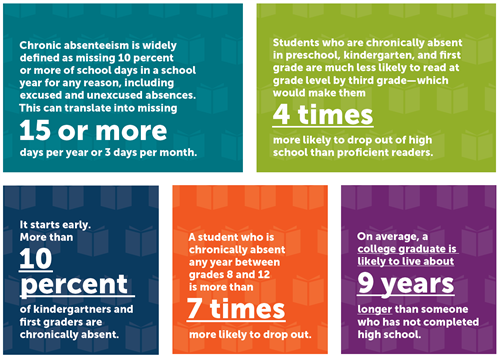-

Attendance
Regular school attendance is essential for a student to make the most of his or her education—to benefit from teacher-led and school activities, to build each day’s learning on the previous, and to grow as an individual. Absences from class result in serious disruption of a student’s mastery of the instructional materials; therefore, the student and parent should make every effort to avoid unnecessary absences. Two state laws—one dealing with compulsory attendance, the other with attendance for course credit—are of special interest to students and parents.
When a student between ages 6 and 19 incurs unexcused absences for three or more days or parts of days within a four-week period, the school will send a notice to the student’s parent, as required by law, to remind the parent that it is the parent’s duty to monitor his or her child’s attendance and to require the student to come to school. This also applies to children younger than 6 who are enrolled in prekindergarten or kindergarten. The notice will inform the parent that the district shall initiate truancy prevention measures.
Per the compulsory attendance law verbiage, “parts of days”, this means that leaving school early or arriving after school begins (tardy), even if the child attended some of the day, may count against the student.
In addition to compulsory attendance law, districts must enforce the 90 percent rule, which states that students in grades K-12 must attend class for 90 percent of the time it is offered to receive credit. The 90 percent rule applies to all absences, including excused absences. If the student doesn’t meet this requirement, an attendance committee will make the determination whether to grant the student credit, depending on the circumstances.
We do recognize that perfect attendance is not always possible. We do not want students who are sick attending classes. If your child is absent from all or part of a school day, the student – upon arrival or return to school – must bring a note signed by the parent or health care professional that describes the reason for the absence. All notes should be provided within five days of returning to school.
TARDIES
- School begins at 7:55 a.m.
- If your child is not in their classroom at 7:55 a.m. when the bell rings, they are considered TARDY for the day.
- If your child has a dental or doctor appointment in the day and they will be arriving late to school, make sure you bring a note from the dentist or the doctor.
ATTENDANCE
- Attendance is taken daily at 9:55 a.m.
- If your child is not at school when the attendance bell rings, they are considered absent.
- If your child is off campus during attendance time (part of day or whole day) for sickness or have a doctor’s appointment, please send a parent or doctor’s note within 5 days of the absence.
- Please provide written documentation for early dismissal. Checking a student out before 3:10pm counts as “early dismissal” and is considered unexcused, unless we have documentation of an appropriate “leave early” reason. Possible excused reasons for early dismissal include dental or medical appointments, funerals, and personal illness determined by the school nurse.
What does the research say?
Across the country, more than 8 million students are missing so many days of school that they are academically at risk. Chronic absence — missing 10 percent or more of school days due to absence for any reason—excused, unexcused absences and suspensions, can translate into third-graders unable to master reading, sixth-graders failing subjects and ninth-graders dropping out of high school.
Retrieved from https://www.attendanceworks.org/chronic-absence/the-problem/.
Tips
- If your child has an appointment, but is present at 9:55am, they will get credit for the day with a medical note. Think about this when making appointments.
- Try to schedule appointments during classes that your child doesn’t need to get credit for in order to go on to the next grade – like PE, co-curr, lunch or recess.
- Switch between morning and afternoon appointments so your child doesn’t miss the same subject all the time.
- At all costs, prevent being absent from reading and math class. Communicate with teachers to see when students will miss the least amount of instruction when scheduling appointments.

Select a School...
Select a School
- Central HS
- Fossil Ridge HS
- Keller HS
- Timber Creek HS
- Keller Compass Center
- Keller Center for Advanced Learning
- Keller Collegiate Academy
- Fossil Hill MS
- Hillwood MS
- Indian Springs MS
- Keller MS
- Timberview MS
- Trinity Springs MS
- Vista Ridge MS
- Bear Creek IS
- Parkwood Hill IS
- Trinity Meadows IS
- Basswood ES
- Bette Perot ES
- Bluebonnet ES
- Caprock ES
- Eagle Ridge ES
- ELC - North
- ELC - South
- Florence ES
- Freedom ES
- Friendship ES
- Heritage ES
- Hidden Lakes ES
- Independence ES
- Keller-Harvel ES
- Liberty ES
- Lone Star ES
- North Riverside ES
- Park Glen ES
- Parkview ES
- Ridgeview ES
- Shady Grove ES
- Sunset Valley ES
- Whitley Road ES
- Willis Lane ES
- Woodland Springs ES


